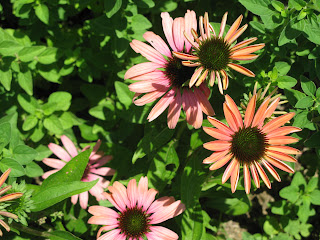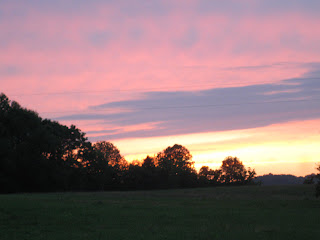The poppy bobbed in the wind as I snapped the shutter.
I greet them each day during their brief season.
Most of the blooms have passed their hours of swaying on stiff stems, the globes of the curing seedpods stand tall above leaves which are rapidly drying to crumpled brown.
Tomorrow--or posibly Friday--will see the last of the blossoms for this season.
I bought a packet of Achillea 'Pastels Mixed' last year.
This is one of the seed-grown plants, already a sizeable clump of soft pink bloom.
This shrub rose has rewarded me with a flush of early summer bloom and a repeat flowering from late August til heavy frost.
I have managed to forget its name at the moment, although I have a list---somewhere.
[Tag found; Rose is Wise Portia]
The yellow Simplicity roses were in full bud when the April frost nipped them.
I clipped off the sad, seared nubs and the reward is a new flower crop.
The Japanese beetles have found the roses--what a scourge they are!
I don't spray my roses--we seem to be using quite enough pesticides to keep the veggie garden producing.
I take a macabre pleasure in squashing the glittery beetles!
Coneflower [echinacea] I bought this one, a variety called Summer Skies, two years ago.
It has been slow to take hold, but looks happier this year.
Monarda Lambada.
These plants were sown in-situ in the rough and ready
lower strip which holds the shrub roses.
I am so delighted with them--they have spread and flourished while my nursery grown monarda, Jacob Cline, wasted away.
Monardas were one of the delightful mainstays of my New England garden; I had them in Cambridge Scarlet, Raspberry Wine--and a dwarf form whose name I don't recall.
My three real disappointments in my flower plantings here are the monardas, delphiniums and alchimilla [Lady's Mantle]
It may be that zone 6 is too hot and humid for all of them.
I likely won't risk money on new potted ones, but may try all three from seed--when the
LONG-PROMISED GREENHOUSE
becomes a reality!
A clump of monarda lambada with Summer Skies coneflower and Coronation Gold achillea
in the background.
I moved the tree lilies last fall.
They were flourishing and had sent up some offspring.
The main plants were bud-filled in March. All but the white ones were frost victims.
This one, along with achillea Paprika, is canting southward.
I blame the attentions of Willis more than the wind!
Another case for keeping a master garden plan or at least a notebook of plants.
[I should be so organized!]
I remember purchasing this rose--probably at Lowes at the end of the season--and setting it in while a passing shower dumped cold trickles down my back.
Both of the main flower strips face south--which makes for splashes of sunlight and shadow unless I take photos in the afternoon after the sun has moved beyond the garage.
The purple-flowered plants with lance-like leaves were a purchase which G. made at the Amish auction last year. Again, I have to do some searching for the name.
It has spread quite aggressively.
In the foreground, the ubiquitous wild onion, rather attractive at the moment --although I root them out when I weed.
The first of the red daylilies have blossomed this week in the inhospitable strip of dirt--not worthy to be called 'soil'--which edges the front porch.
These were snatched up last summer when Wal Mart put packaged bulbs out for half-price.
Our first summer here, the pasture near the haybarn was dotted with clumps of butterfly weed.
I moved one to the upper flower strip, where it is in bud.
Interestingly, the flowers were scarce in the pasture last year and are not in evidence this summer.
Buddleia--Butterfly Bush.
Coronation Gold is one of my favorite achilleas--hardy anywhere.
The achilliea in the foreground is one of my seed grown 'pastels'--it has been over taken by its larger relative and 'wants moved.'






















































